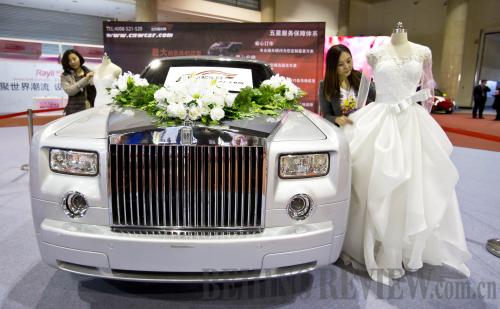|
 |
|
TREND SHOW: Exhibition staff prepare their display before the 2013 Beijing Wedding Expo kicked off on March 1 (ZHAO BING) |
An infographic labeled "China's Map of Bride Prices" has made waves on China's microblogging portal Weibo.com since being released by Cq.house.sina.com.cn on June 4 after a month of nationwide research.
In much of China, the bride price is understood as a reverse dowry in which a groom provides money, gifts or property to his bride and her family in order to marry as a guarantee of material stability.
Shanghai tops the list with an average bride price of at least 1 million yuan ($162,900) plus an apartment, followed by Tianjin and three provinces in northeast China. In Chongqing, southwest China, brides' families rarely request anything.
Marriage a luxury
Data for making the map is "relatively objective," said Hu Zhiwei, Deputy Director of the Planning Department of Cq.house.sina.com.cn.
According to Hu, a total of 300 people were surveyed from different regions to provide information by phone or e-mail. The map also displays the differences between urban and rural areas. For example, in east China's Zhejiang Province, the bride price is 100,000 yuan ($16,290) in rural areas, while in urban areas it is over 150,000 yuan ($23,800).
A groom typically gives the bride's family cash in an amount beginning or ending with a lucky number such as six or eight, such as 80,000 yuan ($13,032), as in one case in central China's Hubei Province, or 58,888 yuan ($9,593) in Shaanxi Province in the northwest. In Inner Mongolia in north China, the typical bride price of 8,888 yuan ($1,448) is accompanied by a number of livestock in multiples of nine. The sanjin, or "three gold" gifts of earrings, necklaces and rings, may be required in addition to cash, and an apartment might be part of the deal in first-tier cities such as Shanghai and Tianjin. In east China's Shandong Province, the denomination is a peculiar novelty: 1.5 kg of 100 yuan notes, worth approximately 130,000 yuan ($21,177).
The intention of the survey, according to Hu, is to show how the tradition has manifested in modern times with the rapid development of the economy and cost of living.
"I saw quite a few couples breaking up just because the man couldn't afford the price," said Hu. "I want to tell people love is precious and shouldn't be killed by money."
But netizens aren't buying it. Male netizens complained that they couldn't afford to marry and expressed the desire to seek a wife from Chongqing. Many commented the survey underestimates standard bride prices.
"I have doubts on the figures. Three-hundred cases is not enough to show the whole picture in China," said netizen Shuoluo, who claims to be a resident in Baotou, Inner Mongolia Autonomous Region. "Nobody in urban areas asks for herds of animals anymore and a flat is also a necessity here."
Beijing's surprisingly modest bride price also became the subject of doubt. According to the map, the bride price in the city bottoms out at 10,001 yuan ($1,629), two boxes of local Daoxiangcun snacks, two bottles of Moutai liquor, two boxes of tea and two boxes of fruit.
"This is so outdated," said Beijing resident Zhang Lele. "These are just superficial customs and what the brides ask for is definitely more than this."
Just married last year, a 27-year-old bride said that in Beijing, the groom is expected to own an apartment. In popular TV show Mother-in-Law's Homecoming, the husband must buy an apartment with no fewer than two bedrooms within Beijing's Third Ring Road that encircles the generally recognized center of the city.
"Build a nest to attract a phoenix," or so the Chinese saying goes. Skyrocketing real estate prices make that an increasingly burdensome requirement: a 100-square-meter apartment in Shanghai costs around 4 million yuan ($652,000).
What is the origin of the tradition? It is said to have been conceived so as to provide for the bride's aging parents, since she would presumably be caring for her husband's parents as they reach retirement age. While such concerns are less of a worry in modern times, the practice remains a custom for saving face, and the bride's parents regard it as an indication of the groom's commitment.
| 